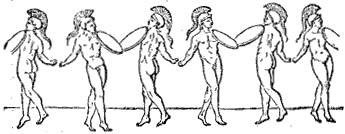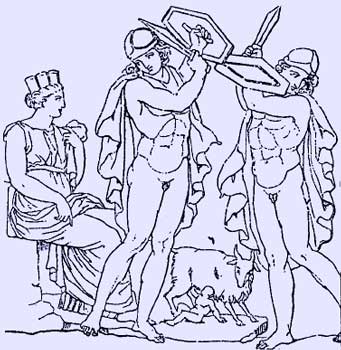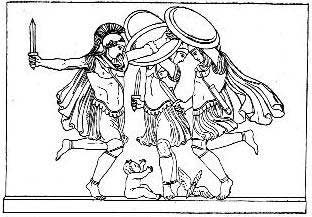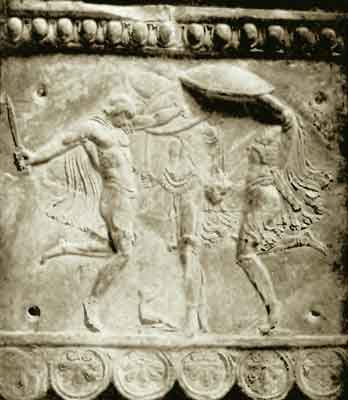.

Woodcut from William Smith's Dictionary of Greek and Roman Antiquities, SALTATIO ("Dance") article. As source for the woodcut the text of the Dicitonary indicates "Museo Pio Clementino (vol. iv, pl. 2)
The Korybantes, called the Kurbantes in Phrygia, Corybants in older English texts and Koryvandes in modern Greek transliteration, were the crested dancers who worshipped the Phrygian goddess Cybele with drumming and dancing. The Kuretes were the nine dancers who venerate Rhea, the Cretan counterpart of Cybele.
These male dancers in armor, kept time to a drum and the rhythmic stamping of their feet. Dance, according to Greek thought, was one of the civilizing activities, like wine-making or music. The dance in armor (the "pyrrhic dance" or pyrriche) was a male coming-of-age initiation ritual linked to a warrior victory celebration.
The French classicist Henri Jeanmaire has shown that both the Kouretes and Cretan Zeus (called "the greatest kouros in Cretan hymns) were intimately connected with the transition of young men into manhood in Cretan cities (in Couroi et Courètes: essai sur l'éducation spartiate et sur les rites d'adolescence dans l'antiquité hellénique, Lille, 1939).
The Phrygian Korybantes were often confused with other ecstatic male confraternities, such as the Idaean Dactyls or the Cretan Kouretes, spirit-youths (kouroi) who acted as guardians of the infant Zeus. In the Greek telling of Zeus' birth, the Kouretes' ritual clashing spears and shields were interpreted as intended to drown out the infant god's cries, and prevent his discovery by his father Cronus. Ovid in Metamorphoses says they were born from rainwater, Ouranos fertilizing Gaia, which might connect them with the Pelasgian Hyades.

Kouretes and Zeus (infant), based on an ancient relief
Korybantes or Kouretes also presided over the infancy of Dionysus, another god who was born as a babe, and of Zagreus, a Cretan child of Zeus. The wild ecstasy of their cult can be compared to the female Maenads who followed Dionysus.
The scholar Jane Ellen Harrison wrote that besides being guardians, nurturers, and initiators of the infant Zeus, the Kouretes were primitive magicians and seers. She also wrote that they were metal workers and that metallurgy was considered an almost magical art. 1
There were several "tribes" of Korybantes, including the Kabeiroi, the Korybantes Euboioi, the Korybantes Samothrakioi. Hoplodamos and his Gigantes were counted among Korybantes, and Titan Anytos was considered a Kourete.
Alternatives: Corybants (older English texts), Koryvandes (modern Greek transliteration).

The Kouretes dance around the infant Zeus as pictured in Jane Ellen Harrison's Themis, 1912, p.23, See right image |
 |
Notes
1 Themis, Chapter I: The Hymn of the Kouretes, p.1 and following pages. On p.26, she writes: "The Kouretes are also, as all primitive magicians are, seers (μαντεις). When Minos in Crete lost his son Glaukos he sent for the Kouretes to discover where the child was hidden. Closely akin to this magical aspect is that fact that they are metal-workers. Among primitive people metallurgy is an uncanny craft and the smith is half medicine man." [1] [2]
References
Jane Ellen Harrison, Themis: A Study of the Social Origins of Greek Religion, 1912. [3]
Paintings
* Jupiter Among the Corybantes (Korybantes), Giuseppe Maria Crespi , c. 1730
Links
- Long review (in English) of Paola Ceccarelli, La pirrica nell' antichità greco romana: Studi sulla danza armata, 1998
| Ancient Greece
Science, Technology , Medicine , Warfare, , Biographies , Life , Cities/Places/Maps , Arts , Literature , Philosophy ,Olympics, Mythology , History , Images Medieval Greece / Byzantine Empire Science, Technology, Arts, , Warfare , Literature, Biographies, Icons, History Modern Greece Cities, Islands, Regions, Fauna/Flora ,Biographies , History , Warfare, Science/Technology, Literature, Music , Arts , Film/Actors , Sport , Fashion --- |
Retrieved from "http://en.wikipedia.org"
All text is available under the terms of the GNU Free Documentation License

